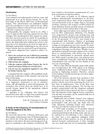 22 citations,
October 2018 in “Aesthetic Plastic Surgery”
22 citations,
October 2018 in “Aesthetic Plastic Surgery” Understanding hair follicle biology and stem cell control could lead to new hair loss treatments.
51 citations,
October 2000 in “Acta dermato-venereologica” PPAR alpha may help in hair growth and could be a target for treatment.

Cosmetics can help with mild skin problems and daily care but must be used carefully to avoid skin irritation.
 January 2024 in “Dermatology practical & conceptual”
January 2024 in “Dermatology practical & conceptual” Male gender and family history predict alopecia areata recurrence.
 November 2022 in “IntechOpen eBooks”
November 2022 in “IntechOpen eBooks” Hair loss can significantly impact a person's mental health, causing issues like anxiety and depression, and stress can trigger hair loss.
 19 citations,
November 2011
19 citations,
November 2011 Using systemic drugs as creams for skin conditions shows promise, but more research is needed to confirm their effectiveness and safety.
 43 citations,
October 2002 in “International Journal of Cosmetic Science”
43 citations,
October 2002 in “International Journal of Cosmetic Science” All three shampoos reduced dandruff and hair loss, but ketoconazole and piroctone olamine also made hair thicker.

People with Down syndrome have a higher risk of skin disorders and need better screening and treatment.
 July 2024 in “Forum Dermatologicum”
July 2024 in “Forum Dermatologicum” Topical treatments for hair loss can be effective but need careful safety evaluation.
 88 citations,
October 2002 in “Journal of Dermatology”
88 citations,
October 2002 in “Journal of Dermatology” Finasteride for hair loss may cause depression, affecting sleep and relationships.
 September 2023 in “Pharmaceuticals”
September 2023 in “Pharmaceuticals” Tiny particles improved delivery of hair loss treatments to hair follicles, with lipid-based particles performing best.
 April 2017 in “Journal of Investigative Dermatology”
April 2017 in “Journal of Investigative Dermatology” Laser treatment may help with hair growth in some people with frontal fibrosing alopecia, but results vary and the exact way it works is unclear.
 July 2000 in “Dermatologic Surgery”
July 2000 in “Dermatologic Surgery” Many skin products get contaminated with bacteria, especially if they're in jars or previously opened.
 27 citations,
July 2018 in “Experimental dermatology”
27 citations,
July 2018 in “Experimental dermatology” Autophagy is crucial for normal sebaceous gland function and sebum composition.
 8 citations,
October 1988 in “Clinics in Dermatology”
8 citations,
October 1988 in “Clinics in Dermatology” Current research explores hair growth drugs, while future research aims for personalized treatments.
 4 citations,
October 2022 in “Genes”
4 citations,
October 2022 in “Genes” Our microbiome may affect the development of the hair loss condition Alopecia Areata, but more research is needed to understand this relationship.
 April 2017 in “International journal of research in Ayurveda and pharmacy”
April 2017 in “International journal of research in Ayurveda and pharmacy” Ayurvedic methods can help reduce the harmful effects of chemicals in cosmetics.
 32 citations,
January 2012 in “International Journal of Dermatology”
32 citations,
January 2012 in “International Journal of Dermatology” Skin side effects from EGFR inhibitor cancer treatment can be managed effectively, often without stopping the medication.
 132 citations,
January 2017 in “International Journal of Molecular Sciences”
132 citations,
January 2017 in “International Journal of Molecular Sciences” Fat-derived stem cells show promise for skin repair and reducing aging signs but need more research for consistent results.
 64 citations,
January 2004 in “American journal of clinical dermatology”
64 citations,
January 2004 in “American journal of clinical dermatology” Folliculitis is an inflammation of hair follicles that requires proper diagnosis and treatment based on the specific cause.
 19 citations,
May 2007 in “Dermatologic therapy”
19 citations,
May 2007 in “Dermatologic therapy” The document concludes that various treatments, including laser therapy, are effective for managing pseudofolliculitis barbae, especially in darker skin types.
 99 citations,
July 2017 in “Clinical Reviews in Allergy & Immunology”
99 citations,
July 2017 in “Clinical Reviews in Allergy & Immunology” New treatments for Alopecia Areata show promise but need to be more effective and affordable.
 8 citations,
February 2017 in “Archives of Dermatological Research”
8 citations,
February 2017 in “Archives of Dermatological Research” Intense pulsed light treatment effectively reduces underarm hair by making hair follicles smaller and extending their resting phase.
 April 2019 in “The journal of investigative dermatology/Journal of investigative dermatology”
April 2019 in “The journal of investigative dermatology/Journal of investigative dermatology” DHT may reduce inflammation caused by certain bacteria in skin cells.
 15 citations,
July 2020 in “Dermatologic Therapy”
15 citations,
July 2020 in “Dermatologic Therapy” FPHL is common in women, influenced by genetics and hormones, and can be treated with medications, laser therapy, or hair transplantation.
 156 citations,
August 2016 in “Journal of controlled release”
156 citations,
August 2016 in “Journal of controlled release” Tight junctions are key for skin protection and controlling what gets absorbed or passes through the skin.
 August 2024 in “Clinical Cosmetic and Investigational Dermatology”
August 2024 in “Clinical Cosmetic and Investigational Dermatology” Enzyme injections can effectively treat epidermoid cysts without surgery.
45 citations,
January 2016 in “Journal of Epidemiology and Global Health” Most pregnant women experience skin changes, with hyperpigmentation being the most common.
 June 2023 in “Buletin de psihiatrie integrativă”
June 2023 in “Buletin de psihiatrie integrativă” Alopecia causes significant emotional distress and psychological issues, requiring combined skin and mental health treatment.
 22 citations,
January 2013 in “International Journal of Trichology”
22 citations,
January 2013 in “International Journal of Trichology” Hair loss is often linked to thyroid problems, especially in women and older people, and screening for thyroid issues is advised for those with hair loss.



























